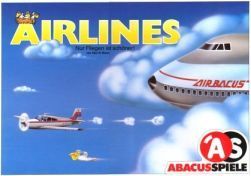Airlines (1990) Board Game
Airlines is a board game released in 1990, designed by Christian Schütte. It falls under the categories of Aviation/Flight and Economic games, with gameplay revolving around investment, network and route building, and stock holding. The game is designed for 2 to 6 players, with a playtime of around 90 minutes and recommended for ages 12 and up.
Game Components of Airlines
How To Setup Airlines
To set up Airlines, place the gameboard in the middle of the table. Each player starts with eight cards from the deck and 8 million euros in cash. Players simultaneously choose two of their stock cards, each from a different airline, and reveal them to form their starting share portfolio. Company markers are placed on the home airport of each airline and on the corresponding spaces on the scoring track. The stock market is initialized by placing the top five cards from the deck on designated spots on the board.
Gameplay Mechanics and Game Objective
Player Experience
Airlines Europe, the evolved version of the original, emphasizes strategic portfolio management and opportunistic route expansion. Players benefit not only from their own actions but also from the actions of other players, as these can increase the value of their shares. The game requires a balance between focusing on high-value airlines and diversifying to maximize points.
Pros
Cons
Personal Thoughts on Airlines
Airlines is ideal for fans of economic and strategy games who enjoy complex, interconnected mechanics. It’s not a game for casual players due to its depth and the need for strategic planning. However, for those who enjoy games like Union Pacific and other economic strategy titles, Airlines offers a rich and engaging experience. The game’s design encourages players to Think ahead and adapt to the dynamic market and actions of other players, making it a great choice for experienced board game enthusiasts.
We are supported by our audience. When you purchase through links on our site, we may earn an affiliate commission, at no extra cost for you. Learn more.

